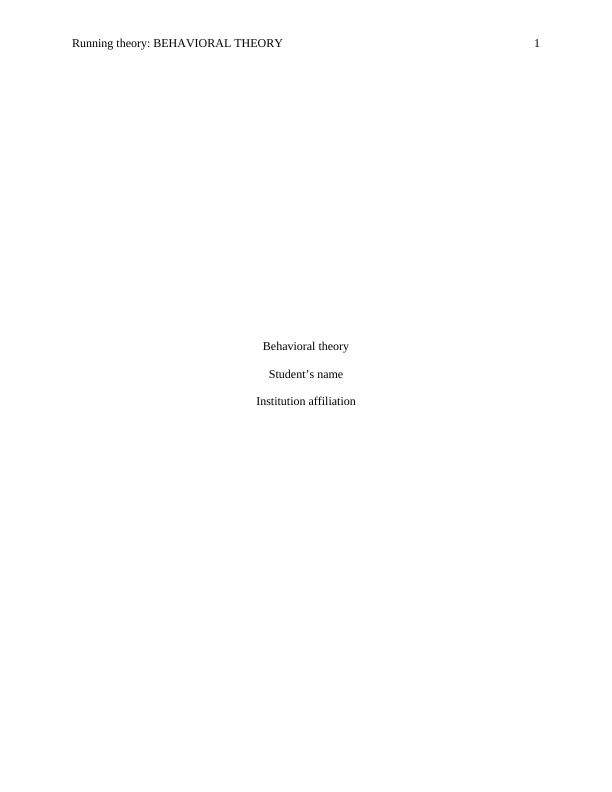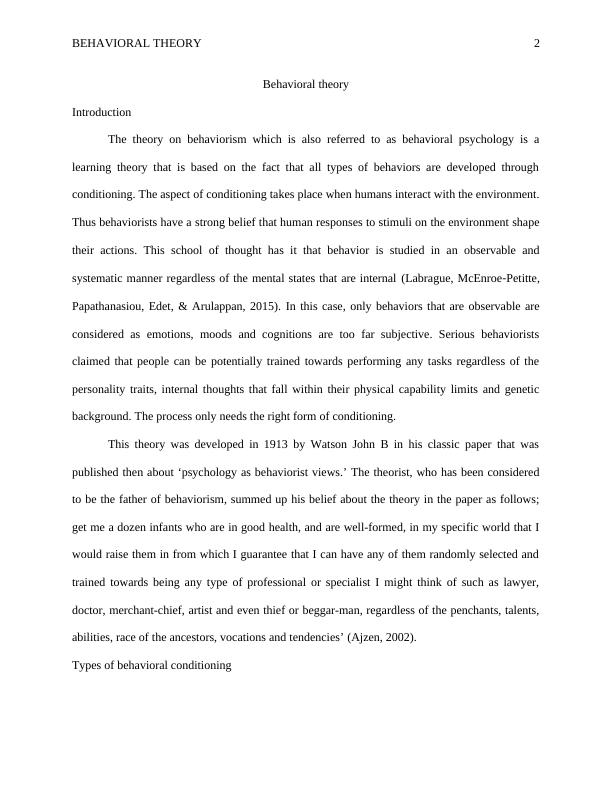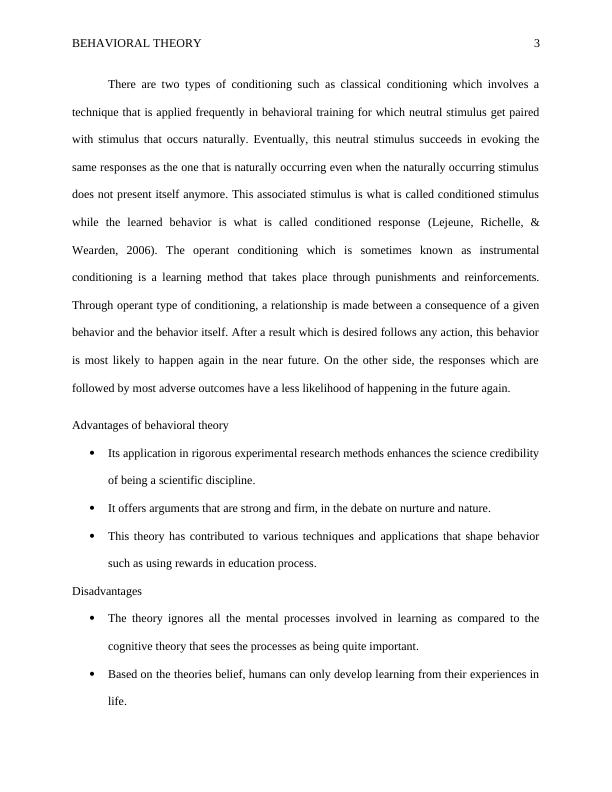Behavioral Theory: Types of Conditioning, Advantages and Disadvantages
Added on 2023-04-24
8 Pages2008 Words470 Views
Running theory: BEHAVIORAL THEORY 1
Behavioral theory
Student’s name
Institution affiliation
Behavioral theory
Student’s name
Institution affiliation

BEHAVIORAL THEORY 2
Behavioral theory
Introduction
The theory on behaviorism which is also referred to as behavioral psychology is a
learning theory that is based on the fact that all types of behaviors are developed through
conditioning. The aspect of conditioning takes place when humans interact with the environment.
Thus behaviorists have a strong belief that human responses to stimuli on the environment shape
their actions. This school of thought has it that behavior is studied in an observable and
systematic manner regardless of the mental states that are internal (Labrague, McEnroe‐Petitte,
Papathanasiou, Edet, & Arulappan, 2015). In this case, only behaviors that are observable are
considered as emotions, moods and cognitions are too far subjective. Serious behaviorists
claimed that people can be potentially trained towards performing any tasks regardless of the
personality traits, internal thoughts that fall within their physical capability limits and genetic
background. The process only needs the right form of conditioning.
This theory was developed in 1913 by Watson John B in his classic paper that was
published then about ‘psychology as behaviorist views.’ The theorist, who has been considered
to be the father of behaviorism, summed up his belief about the theory in the paper as follows;
get me a dozen infants who are in good health, and are well-formed, in my specific world that I
would raise them in from which I guarantee that I can have any of them randomly selected and
trained towards being any type of professional or specialist I might think of such as lawyer,
doctor, merchant-chief, artist and even thief or beggar-man, regardless of the penchants, talents,
abilities, race of the ancestors, vocations and tendencies’ (Ajzen, 2002).
Types of behavioral conditioning
Behavioral theory
Introduction
The theory on behaviorism which is also referred to as behavioral psychology is a
learning theory that is based on the fact that all types of behaviors are developed through
conditioning. The aspect of conditioning takes place when humans interact with the environment.
Thus behaviorists have a strong belief that human responses to stimuli on the environment shape
their actions. This school of thought has it that behavior is studied in an observable and
systematic manner regardless of the mental states that are internal (Labrague, McEnroe‐Petitte,
Papathanasiou, Edet, & Arulappan, 2015). In this case, only behaviors that are observable are
considered as emotions, moods and cognitions are too far subjective. Serious behaviorists
claimed that people can be potentially trained towards performing any tasks regardless of the
personality traits, internal thoughts that fall within their physical capability limits and genetic
background. The process only needs the right form of conditioning.
This theory was developed in 1913 by Watson John B in his classic paper that was
published then about ‘psychology as behaviorist views.’ The theorist, who has been considered
to be the father of behaviorism, summed up his belief about the theory in the paper as follows;
get me a dozen infants who are in good health, and are well-formed, in my specific world that I
would raise them in from which I guarantee that I can have any of them randomly selected and
trained towards being any type of professional or specialist I might think of such as lawyer,
doctor, merchant-chief, artist and even thief or beggar-man, regardless of the penchants, talents,
abilities, race of the ancestors, vocations and tendencies’ (Ajzen, 2002).
Types of behavioral conditioning

BEHAVIORAL THEORY 3
There are two types of conditioning such as classical conditioning which involves a
technique that is applied frequently in behavioral training for which neutral stimulus get paired
with stimulus that occurs naturally. Eventually, this neutral stimulus succeeds in evoking the
same responses as the one that is naturally occurring even when the naturally occurring stimulus
does not present itself anymore. This associated stimulus is what is called conditioned stimulus
while the learned behavior is what is called conditioned response (Lejeune, Richelle, &
Wearden, 2006). The operant conditioning which is sometimes known as instrumental
conditioning is a learning method that takes place through punishments and reinforcements.
Through operant type of conditioning, a relationship is made between a consequence of a given
behavior and the behavior itself. After a result which is desired follows any action, this behavior
is most likely to happen again in the near future. On the other side, the responses which are
followed by most adverse outcomes have a less likelihood of happening in the future again.
Advantages of behavioral theory
Its application in rigorous experimental research methods enhances the science credibility
of being a scientific discipline.
It offers arguments that are strong and firm, in the debate on nurture and nature.
This theory has contributed to various techniques and applications that shape behavior
such as using rewards in education process.
Disadvantages
The theory ignores all the mental processes involved in learning as compared to the
cognitive theory that sees the processes as being quite important.
Based on the theories belief, humans can only develop learning from their experiences in
life.
There are two types of conditioning such as classical conditioning which involves a
technique that is applied frequently in behavioral training for which neutral stimulus get paired
with stimulus that occurs naturally. Eventually, this neutral stimulus succeeds in evoking the
same responses as the one that is naturally occurring even when the naturally occurring stimulus
does not present itself anymore. This associated stimulus is what is called conditioned stimulus
while the learned behavior is what is called conditioned response (Lejeune, Richelle, &
Wearden, 2006). The operant conditioning which is sometimes known as instrumental
conditioning is a learning method that takes place through punishments and reinforcements.
Through operant type of conditioning, a relationship is made between a consequence of a given
behavior and the behavior itself. After a result which is desired follows any action, this behavior
is most likely to happen again in the near future. On the other side, the responses which are
followed by most adverse outcomes have a less likelihood of happening in the future again.
Advantages of behavioral theory
Its application in rigorous experimental research methods enhances the science credibility
of being a scientific discipline.
It offers arguments that are strong and firm, in the debate on nurture and nature.
This theory has contributed to various techniques and applications that shape behavior
such as using rewards in education process.
Disadvantages
The theory ignores all the mental processes involved in learning as compared to the
cognitive theory that sees the processes as being quite important.
Based on the theories belief, humans can only develop learning from their experiences in
life.

End of preview
Want to access all the pages? Upload your documents or become a member.
Related Documents
Classical Conditioning and Cognitive Model of Human Learninglg...
|11
|592
|76
Behaviour Development Through Classical Conditioninglg...
|9
|1758
|22
Introduction to Psychology: Learning, Classical Conditioning, Operant Conditioning, and Social Learninglg...
|9
|1819
|188
Psychology Assignment Presentationlg...
|23
|1219
|296
Introduction to Psychology Theory 2022lg...
|10
|2712
|26
Behavioral Perspective Assignmentlg...
|5
|657
|139
